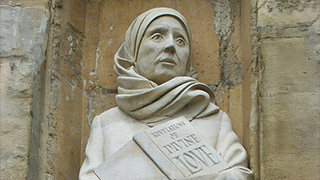Seton Hall Professor Redwood Plays Leading Role in Enslavement Era Disclosure and Redress Act, Introduced in Illinois Legislature
Monday, March 31, 2025
 On January 28, 2025, Illinois State Representative Sonya Harper introduced House Bill
1227, the Enslavement Era Disclosure and Redress Act, at a press conference at the Illinois State Capitol. The proposed legislation seeks
corporate accountability for historical ties to slavery, requiring companies that
seek to do business with the state of Illinois to investigate and disclose any historical
links to slavery.
On January 28, 2025, Illinois State Representative Sonya Harper introduced House Bill
1227, the Enslavement Era Disclosure and Redress Act, at a press conference at the Illinois State Capitol. The proposed legislation seeks
corporate accountability for historical ties to slavery, requiring companies that
seek to do business with the state of Illinois to investigate and disclose any historical
links to slavery.
Britta Redwood, assistant professor at the School of Diplomacy and International Relations and School of Law, was instrumental in drafting House Bill 1227 and was at the press conference that day. Her work on the bill began during her tenure as director of the Movement Lawyering Clinic at Howard University School of Law, where she collaborated with students and advocates, including Reparations United and the Center for Racial Equity at ArendtFox Schiff, to develop legal strategies for addressing the historical role of corporations in slavery.
House Bill 1227 requires companies to conduct internal investigations into their historical records, including any ties to slavery for companies they have merged with or acquired. If a company identifies links to slavery, it must disclose relevant records, participate in a public hearing to discuss its findings and provide a statement outlining its plans for redress. Every company that seeks to contract with the state of Illinois would be required to perform this investigation. Companies that refuse, misrepresent or fail to disclose their findings will be barred from contracting with the state.
 As Redwood said at the press conference, "The institution of slavery was the source
of unprecedented wealth in the South and the North and indeed around the globe. People
in this country fought and died to create conditions of legal equality, but economic
equality has proven far more elusive." She explained that most corporations that directly
profited from or participated in that system have never been held to account or even
subjected to public scrutiny. Most Americans are unaware that many banks, insurance
companies and manufacturers that still exist today have historic ties to slavery.
As Redwood said at the press conference, "The institution of slavery was the source
of unprecedented wealth in the South and the North and indeed around the globe. People
in this country fought and died to create conditions of legal equality, but economic
equality has proven far more elusive." She explained that most corporations that directly
profited from or participated in that system have never been held to account or even
subjected to public scrutiny. Most Americans are unaware that many banks, insurance
companies and manufacturers that still exist today have historic ties to slavery.
"This bill allows us to confront our past with honesty in a way that honors the dignity of those whose labor and capital have so long been exploited and in a way that invites and, indeed, challenges those who have benefited from that exploitation to make things right," said Redwood in her remarks before the press. She explained that House Bill 1227 does not impose government reparations but instead creates a framework for private-sector accountability, reinforcing the idea that corporations—like individuals—must reckon with their past to move toward justice. In the words of Redwood, "Reparatory justice is a human right." She is optimistic that the enthusiasm of advocates and legislators will carry the bill forward.
Categories: Law





